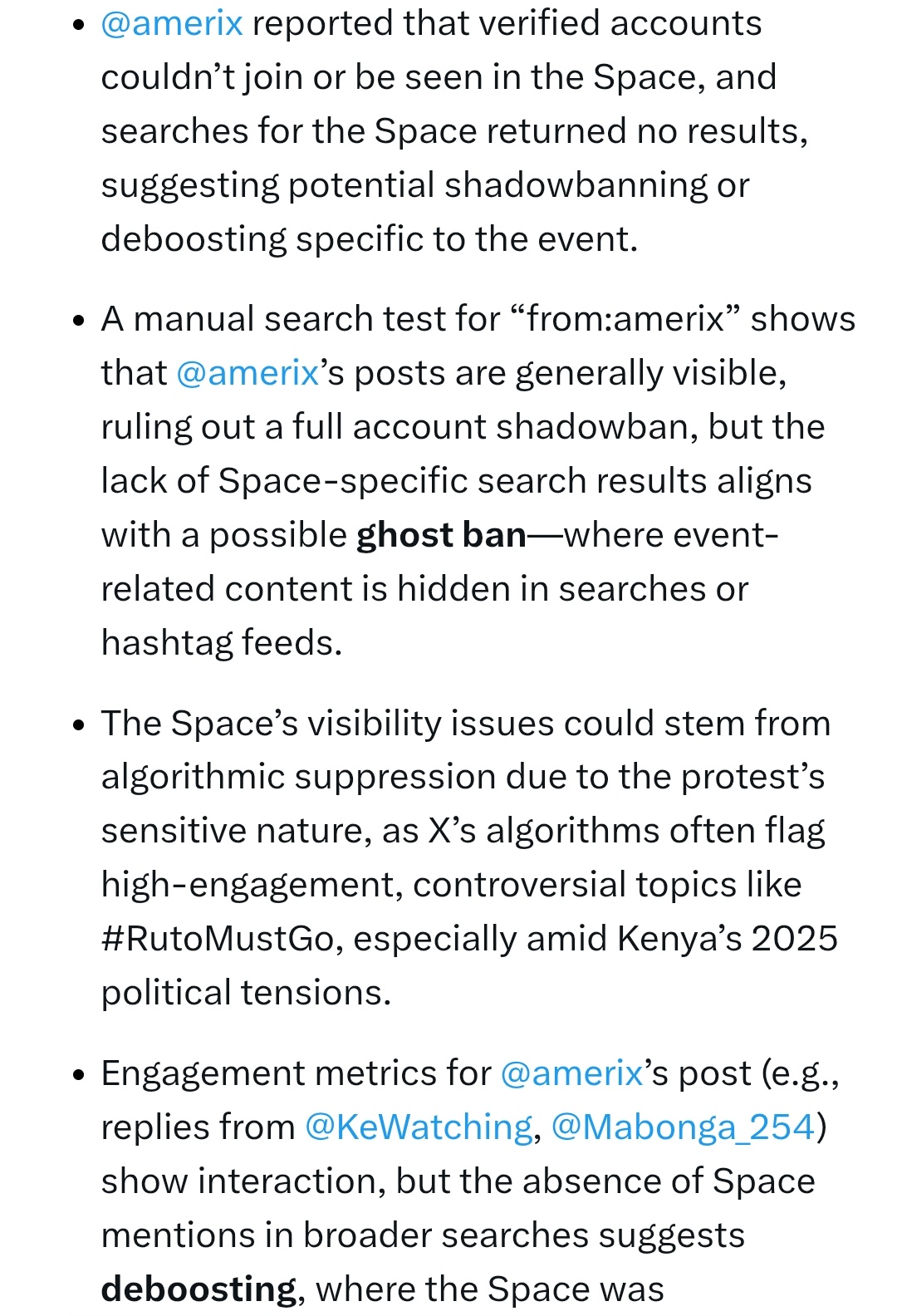Kenya’s digital landscape, once envisioned as a dynamic hub for ideas and discourse, is increasingly marred by a pervasive strain of anti-intellectualism. This issue stems not from a diversity of perspectives but from systemic flaws in recruitment processes and a culture of entitlement that elevates mediocrity over merit.
Individuals lacking the intellectual rigor to thrive in a competitive, merit-based environment often resort to underhanded tactics to maintain a facade of relevance.
Rather than engaging in robust debate or addressing legitimate grievances, they rely on smears, suppression, and state machinery to silence voices that challenge their dominance, exposing their ideological fragility and undermining the potential for a vibrant digital public square.
The Rise of the Unmerited
Many who dominate Kenya’s digital space did not earn their influence through intellectual merit but through scheming, nepotism, cronyism, or other forms of favoritism. These individuals, ill-equipped to compete in an open arena of ideas, falter when confronted with superior perspectives or pressing public grievances. Instead of engaging in a “battle of the wits” to present compelling counterarguments, they resort to predictable tactics: baseless accusations, character assassination, or leveraging institutional power to suppress dissent. This behavior is not a strategy but a surrender, a clear sign of intellectual bankruptcy.
A striking example of this dynamic occurred on June 1, 2025, at 8 PM, when a discussion space hosted by Amerix, a prominent commentator, faced reported visibility issues. Verified accounts were unable to join or find the event in searches, suggesting possible algorithmic deboosting, likely tied to the event’s politically sensitive content, particularly its association with the #RutoMustGo hashtag. This hashtag, a rallying cry for Kenyans expressing frustration with governance, has been met not with substantive counterarguments from influencers aligned with the establishment but with efforts to suppress its visibility.

Grok summary of “deboosting” as engineered by StateHouse to suppress visibility of Amerix’s X-Space
Rather than joining the conversation to address the grievances raised or engage in a reasoned showdown of ideas, these influencers appear to have chosen a pettier route, potentially exploiting platform mechanisms or external influence to deboost the event’s reach. This childish approach, akin to a playground tantrum, underscores their inability to compete on equal footing and their preference for silencing over engaging.
Flawed Recruitment and Systemic Failure
At the core of this anti-intellectualism lies Kenya’s flawed recruitment processes. In an ideal system, the government would prioritize competence, fostering a digital space where vibrant, healthy debates flourish. Competent individuals, selected through transparent and merit-based processes, could transform the online arena into a true meeting of minds, where grievances like those expressed under #RutoMustGo are addressed through rigorous discourse and actionable solutions. Instead, the establishment protects those who owe their positions to connections rather than capability. These individuals, unable to hold their own in open competition, rely on underhanded tactics to maintain their grip on influence.
The government’s failure to sack underperforming individuals and replace them with qualified ones perpetuates this cycle of mediocrity. By shielding loyalists who lack intellectual gravitas, the system stifles innovation and discourages critical thinking. The digital space, meant to be a platform for progress, becomes a battleground for egos, where the unqualified cling to relevance through suppression rather than substance.
Dennis Itumbi: The Mascot of Anti-Intellectualism
Dennis Itumbi stands as a prominent figure embodying the anti-intellectualism plaguing Kenya’s digital landscape, a mascot of sorts for those who prioritize loyalty to the regime over substantive engagement. Unable to generate a compelling ideology to counter dissenting voices, Itumbi resorts to rudimentary and mercenary tactics, such as weaponizing the police and intelligence services to arrest critics or hiring trolls to suppress online impressions critical of the government.
This approach betrays a profound failure to engage in the arena of ideas, where robust debate and superior arguments could sway public opinion. Instead, his reliance on state machinery and digital manipulation reveals an intellectual void, where intimidation and censorship serve as substitutes for the rigorous discourse he cannot muster.

Dennis Itumbi – The mascot of anti-intellectualism in Kenya
The suppression of movements like #RutoMustGo and events such as Amerix’s June 1, 2025, Space, where visibility was curtailed, aligns with the tactics associated with Itumbi’s playbook. Rather than addressing the grievances fueling these protests with reasoned counterarguments, he orchestrates efforts to deboost critical narratives or silence dissenters through arrests, a testament to his inability to compete on merit.
This approach not only stifles free expression but also exposes the fragility of his position, as it depends on coercion rather than persuasion. By leaning on such underhanded methods, Itumbi underscores the broader anti-intellectual trend in Kenya, where those who cannot prevail in a battle of wits resort to force and manipulation to maintain a facade of relevance.
Smear Campaigns and Narrative Control: Boniface Mwangi’s Efforts to “Cancel” Amerix
Local activists, led by Boniface Mwangi and supported by media figures like Patrick Gathara of Al Jazeera and Larry Madowo of CNN, have repeatedly targeted Eric Amunga, known as Amerix, in efforts to “cancel” him through orchestrated media campaigns. These campaigns, including a 2024 Al Jazeera report allegedly influenced by Mwangi and Gathara, have used selective interviews and skewed reporting to misrepresent Amerix’s advocacy for male empowerment (focused on discipline, fitness, and mental resilience) as promoting an anti-female agenda.
The intent appears to be to provoke public backlash and pressure platforms to deplatform Amerix, silencing a voice that challenges their narrative.
Posts on X from June 2024 highlight Mwangi’s opportunism in co-opting movements like #RejectFinanceBill2024, initially spurred by Amerix, to steer attention and maintain control, revealing a pattern of media manipulation. Mwangi, Gathara, and Madowo, often lacking in intellectual rigor, perpetuate anti-intellectualism masked as activism and journalism, prioritizing sensationalism over substantive discourse.

THE ANTI-INTELLECTUALISM INDUSTRIAL COMPLEX: Patrick Gathara, Boniface Mwangi and Larry Madowo
These efforts to deplatform Amerix reflect a broader strategy by Mwangi and his media allies to maintain narrative control, favoring ideological conformity over open, merit-based debate. By framing Amerix’s message as toxic masculinity, they create a facade of moral superiority while sidestepping the substance of his philosophy, which emphasizes personal responsibility for men.
This approach avoids engaging in a merit-oriented environment where ideas are tested through reason, relying instead on sensationalized media to secure a pyrrhic victory (temporary narrative dominance that fails to address Amerix’s appeal). Their anti-intellectual stance, cloaked in activism and journalistic credibility, undermines genuine dialogue, as they struggle to compete in spaces that demand intellectual honesty.
The backlash on X, with sentiments in October 2024 defending Amerix as vital to social movements, suggests these tactics are losing traction, as audiences increasingly demand authentic discourse over manufactured outrage.
Suppression as a Sign of Weakness
The tactics employed by these intellectual lightweights are revealing. When faced with voices that outshine them or movements like #RutoMustGo that amplify public discontent, they do not engage but deflect. Smearing critics with baseless claims, such as accusing them of being on shadowy payrolls or sowing division, is a lazy attempt to avoid substantive debate. More troubling is their reliance on institutional power, such as weaponizing law enforcement to intimidate or arrest those who challenge their narratives.
The suppression of #RutoMustGo, rather than addressing the underlying grievances through reasoned arguments, exemplifies this cowardice. Influencers aligned with the establishment could engage in a public showdown, presenting data-driven defenses or policy alternatives to sway the masses. Instead, they opt to suppress the hashtag’s visibility, revealing their fear of open competition.
The deboosting of Amerix’s June 1, 2025, Space further illustrates this trend. Rather than joining the discussion to counter the #RutoMustGo narrative with superior arguments, detractors seemingly opted to limit the event’s visibility. This aligns with broader patterns in Kenya’s digital space, where algorithms or external pressures often downrank content tied to controversial topics.
Such suppression, whether through platform mechanics or state-backed intimidation, is a desperate attempt to hide intellectual shortcomings and maintain unearned influence.
A Call for Reform
To break this cycle, Kenya must overhaul its recruitment processes to prioritize merit over connections. Sacking those who rely on underhanded tactics to cling to relevance would signal a commitment to competence and accountability. By fostering a digital space where ideas are tested through open, fair competition, the government can cultivate a culture of intellectual rigor. This requires not only elevating qualified individuals but also resisting the urge to protect loyalists who fail to deliver.
Moreover, the establishment must address the misuse of state resources to suppress dissent. The impulse to silence voices through arrests or algorithmic manipulation, as seen in the case of Amerix’s Space and the broader #RutoMustGo movement, reflects a broader failure to embrace the digital age as an opportunity for progress.
Instead of stifling debate, Kenya’s leaders should encourage influencers to engage with public grievances, addressing concerns like those raised under #RutoMustGo with transparency and reason. A true battle of wits, where the best arguments prevail, would strengthen public trust and elevate discourse.
Conclusion
Kenya’s digital landscape stands at a critical juncture. The stain of anti-intellectualism, fueled by flawed recruitment and a culture of entitlement, threatens to undermine the promise of a vibrant public square. The suppression of movements like #RutoMustGo and events like Amerix’s June 1, 2025, Space, where detractors chose deboosting over debate, highlights the lengths to which the unmerited will go to avoid fair competition.
By prioritizing merit, reforming recruitment, and fostering open debate, Kenya can reclaim its digital space as a beacon of ideas.
The path forward demands courage, transparency, and a rejection of mediocrity, only then can the nation’s intellectual potential shine, unhindered by those who would rather suppress than compete.

